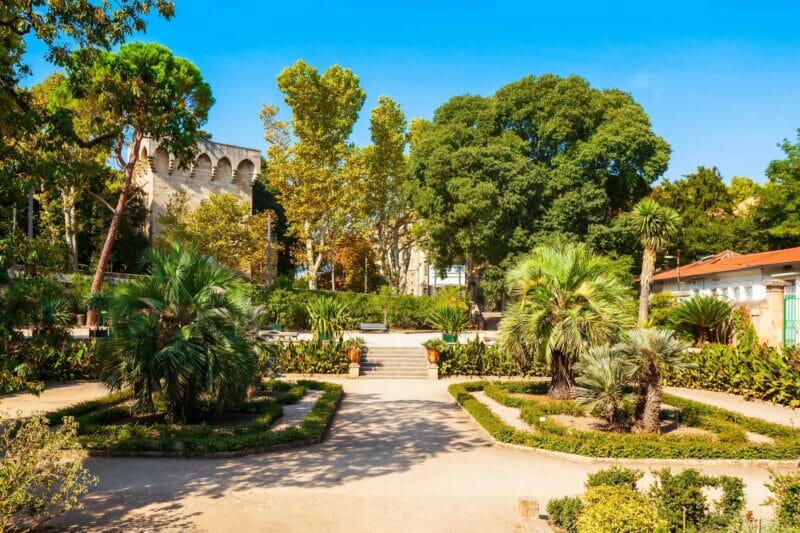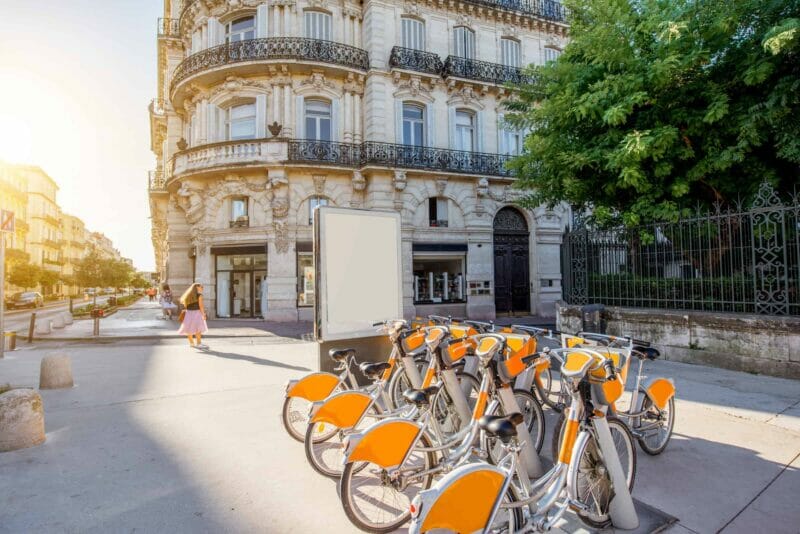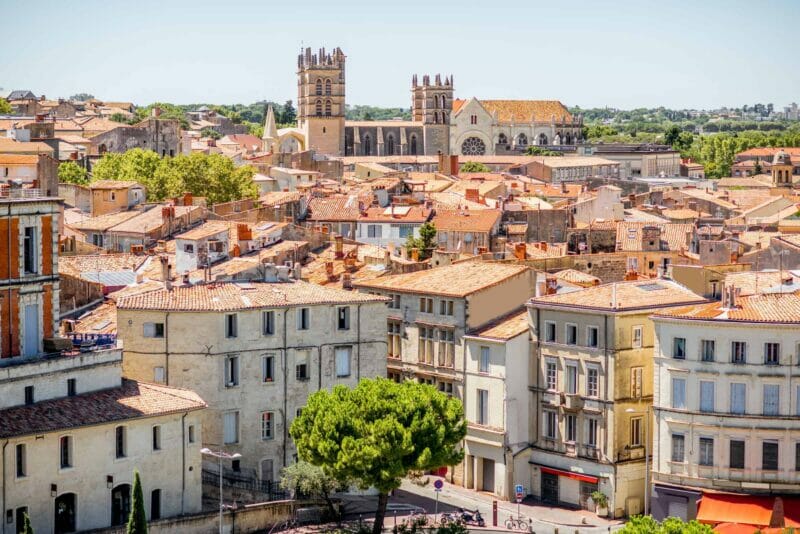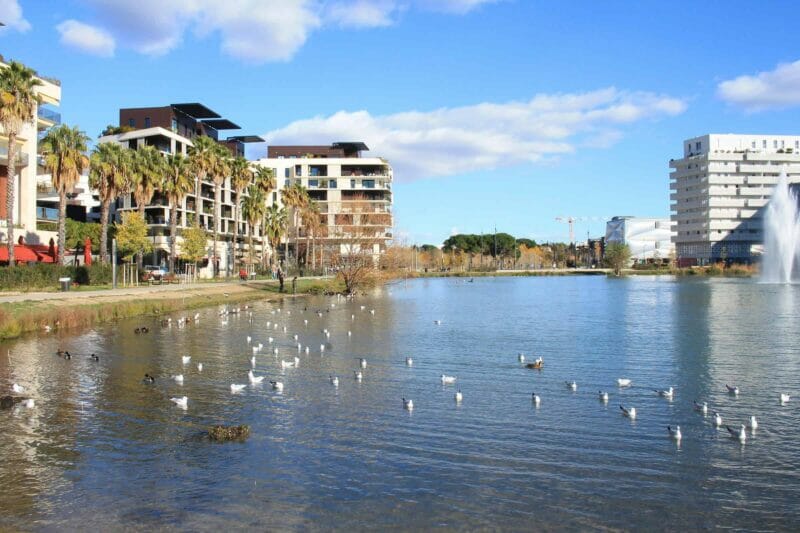Montpellier is one of the lesser-known cities on the French Riviera, but you’ll still find everything you could want from the French Mediterranean coast.
If you’re thinking about living in Montpellier, you might have questions about the lifestyle that awaits you there.
In this guide, we’ll cover important topics about what it’s like to live in Montpellier, France. We’ll look at things such as the cost of living, the best areas for retirement in the city, and some general tips for getting the most out of this exciting French city.
What is Montpellier like?
Montpellier is located in the Occitanie region of France and boasts a colorful history.
The city was a main hub on the Mediterranean coast during the Middle Ages, and its university is one of the oldest in the world. Established in 1220, its medical school is the oldest in the world that’s still in operation, and saw notable alumni such as Nostradamus.
In recent decades, Montpellier has experienced some of the strongest economic growth in France, and in 2017 it was nominated for the Best Emerging Culture City of the Year award. It regularly ranks high on lists of living quality worldwide and in France.
Its university is still one of the city’s main economic draws. Each year, roughly 70,000 students make their home in Montpellier, meaning it has one of the highest student populations in Europe.
Montpellier is located around 6 miles from the French coast and is quite hilly in its topography. There are a lot of beautiful beaches not far from Montpellier, and you can enjoy a brilliant time out at the seaside.
Plage de L’Espiguette, for example, has been voted one of the most beautiful beaches in France. The beach stretches almost 18 kilometers long, with sand, dunes, and great waves crashing onto the shoreline.
Is Montpellier a good place to live?
Living in Montpellier can be the most amazing experience of your life if you are looking for culture, good infrastructure, great weather, all the amenities within walking distance, and a sophisticated yet not too urbanized lifestyle.

Montpellier is nicknamed “gifted” by the French, and if you get a chance to experience its lifestyle, you can see why.
Montpellier is a dynamic city that fuses traditional French culture with modern industries and innovation.
It’s home to the largest pedestrian area in Europe – making it a great city for walkers. When you explore its winding streets, you’ll find a mix of family-run bakeries, boutique clothes shops, open-air markets, and a fair few cafes and restaurants.
Like other cities on the French south coast, Montpellier experiences some amazing weather. Its proximity to the Mediterranean regulates the temperature much more than inland locations, meaning there’s less variation between summer and winter temperatures.
In the summer, you can expect highs of 24 degrees C, which drops to around 7 or 8 degrees C in the winter. Rainfall is moderate, with January and November regularly ranking as the wettest months. Summers are dry, with around 11 hours of sunshine a day in July.
Then, of course, you have amazing food and wine like anywhere else in France. If you like to cook at home, plenty of markets sell local produce. But if you prefer to eat out, you won’t be short of choices, including a selection of Michelin-starred restaurants.
Finally are the city’s cultural and sightseeing opportunities. Montpellier is home to two large concert venues: L’Arena (14,000 seats) and Le Zenith Sud (7,000 seats).
There’s an annual opera festival each summer that features over 150 events and an annual cinema festival held in the autumn. The festival, Cinemed, is the second-largest in France behind Cannes.
In Montpellier, you’ll also find attractions such as Le Jardin des Plantes de Montpellier, the oldest botanical garden in France, a 12th-century ritual Jewish bathhouse, 17th-century mansions, and the citadel of Montpellier, among others.
In short, living in Montpellier has plenty to offer those after good weather and culture without the same level of tourism you’d find if living in some of the better-known French Riviera cities.
Is Montpellier, France, safe?
Montpellier is as safe as any city can be. You will probably be wise not to risk walking alone at night in poorly lit areas or dark alleyways or leave your car unlocked or your personal possessions unattended.
Crime relating to theft is generally regarded as moderate, although the risk of general theft is ranked relatively high.
Montpellier’s figures are almost no different from London’s. Large cities are not unusual to rank highly in crime statistics, particularly those with a robust police presence. If you’d be happy to live in a large British city, then there’s no reason you wouldn’t feel safe living in Montpellier.
Areas to avoid in Montpellier
You will have no problem finding a safe and peaceful location in Montpellier; however, some areas are best avoided, like any large city.
- The Mosson area in the northwest of Montpellier.
- The Ecusson and the Saint Roch areas around the Montpellier train station
The pros and cons of living in Montpellier, France
While breaking a city down into its main pros and cons can only be helpful to an extent, it is always a useful way of seeing its main draws in black and white. Here is a breakdown of the main pros and cons of living in Montpellier, France.

Pros of living in Montpellier
1. Plenty of cultural activities
Montpellier is home to many music and cinema festivals that appeal to all tastes. Along with the historic buildings and botanic gardens, you’ll also find music festivals based on jazz, world music, rhythm and blues, and electronic music. Finding something to do almost all year round won’t be difficult.
2. Booming economic growth
The city is the fastest-growing in France, and this brings many benefits. Most important are factors such as better infrastructure, sustainable living, and plenty of investment opportunities (if that’s something you’re looking for in retirement).
3. Amazing food and wine
It almost goes without saying that a French city has great food and wine opportunities. Whether you visit the Saturday market in Les Arceaux or the Marche du Lez, book a table at the Michelin-starred La Reserve Rimbaud, or drop into one of the numerous cafes or wine bars, you won’t be short of options for typical French food.
4. International connections
Montpellier has its own airport with connections to the UK, but you also have Nimes, Marseille, Beziers, and Avignon, all within a driveable distance. You really won’t be short of options for international connections.
5. Almost everything is within walking distance
Montpellier is a fairly small city, and while its public transport is acceptable, you can reach almost anywhere on foot or bike. This is a particular bonus for those wanting a more active lifestyle in retirement.
Cons of living in Montpellier
1. It can rain a lot in the winter
Anyone who’s lived in a coastal city before will know the impact this has on the weather. While the summers remain fairly dry, rain can be quite heavy in the autumn and winter. But if you’re relocating from the UK, this is probably something you’re used to!
2. Administration can take a long time
It’s a fairly common fact that administration isn’t one of France’s strong suits, and it’s no different in Montpellier. Expect simple things like arranging permits and licenses and opening a bank account to take longer than you might think.
3. High student population
This might not be a major con for many people, but 50% of Montpellier’s population is under 34. If you’re looking for established expat communities of people in your own age group, there might be better retirement destinations in France.
What to expect if you retire in Montpellier, France
Montpellier has a fairly sizeable international expat community, although it’s not as popular with British expats as other French cities. That said, you should be able to find some local community groups to help ease you into your new French lifestyle.

It’ll be a suitable choice for those wanting a more active lifestyle. Owning a car won’t be necessary if you plan on living in the city. There’s plenty to keep you busy and good public transport connections into and out of the city (including a beach shuttle).
Those expats living in Nice, Cannes, Marseille, or other internationally renowned French cities can get away with knowing little French. However, if you choose Montpellier, you’ll need to brush up on your French because English isn’t as widely spoken here.
Shopkeepers might have some basic knowledge, but you’ll be looked upon more favorably for speaking their language. Several language schools in the city offer courses for expats.
How expensive is it to live in Montpellier?
Due to its location on the south coast of France, the cost of living in Montpellier is slightly higher than in more rural French destinations. At the end of the day, living in the French Riviera doesn’t come cheap.
On the other hand, it’s slightly lower than places such as Nice and Marseille because it’s not seen in the same “exclusive” way.
Compared to London, the cost of living in Montpellier comes out lower. Restaurant prices are around 20% lower in Montpellier, but grocery prices are roughly 22% higher. However, if you buy from local markets, you can get great savings by haggling with sellers (something you’ll get used to the longer you live there).
As you can probably guess, rent and property prices are considerably lower in Montpellier. A 3-bed apartment in the city center will cost you around €1500 monthly.
When buying a property, expect to pay around €3,500 (£3,200) a square meter for central properties.
Of course, this will vary depending on the location. Areas outside the city center will be considerably cheaper, and the city has many opportunities for buying property.
Thanks mainly to its recent economic boom, there has been a lot of construction work. It shouldn’t be difficult to snap up an attractive modern property for little money.
Finally, you can expect to pay around €115 (£103) monthly for important utilities.
While Montpellier might not have the lowest cost of living in France, it’ll still be a pleasant surprise for most Brits, Americans, and Northern Europeans. You should be able to live a fairly varied and interesting lifestyle for around €1,400 a month for a couple, excluding rent.
- Renting A Property In France – rental procedures and rules in France that you need to know before signing a French rental contract;
- A Complete Guide To Buying A Property In France – understand how buying a property is done in France to ensure a safe house purchase.
Best neighborhoods in Montpellier, France
So if the cost of living in Montpellier seems attractive to you in retirement, it’s worth deciding where would be best to settle down. The city is divided into seven official neighborhoods, each of which has subdivisions.
If you’re unfamiliar with the city, it’s probably worth finding an inexpensive rental (or longer-term hotel) that you can use as your base. Then explore the neighborhoods to see which most appeals to you.
It’ll obviously be worth researching local immobiliers (estate agents) to see their available properties.
Here are some of the most attractive neighborhoods in Montpellier for retiring expats:
Les Arceaux
Les Arceaux is fairly centrally located and has everything you could need. It’s home to one of the best open-air markets in the city and has great tram connections. What’s more, it’s fairly inexpensive regarding property prices.
Antigone

Antigone is a recent residential development in Montpellier, located east of the city center. Development only started in the late 1970s, and the buildings are fairly modern by the city’s standards. It has plenty of tram connections to the rest of the city too.
Castelnau-le-Lez
Located on the banks of the River Lez, Castelnau is part of the larger Montpellier metropolitan area. It’s located north of the city and is a slightly hillier region. But this means better air quality, more open spaces, and a quieter lifestyle. The village has been an active site for over 2,000 years, but the community, as you’ll see it today, is mainly based on its 12th-century iteration.
Beaux Arts
Beaux Arts is one of the trendier areas of Montpellier and is home to a museum, an open-air market, and plenty of alfresco wine bars. It’s popular with university students but is equally home to more bohemian populations looking for the artistic lifestyle you’d expect from such a cultural city.
Port Marianne

Port Marianne is roughly a mile from the city center, but, as the name suggests, it is built on a port. It’s got greener with more open spaces than other central locations, so it strikes a nice balance between city living and nature. Also, it’s home to the city’s aquarium.
Final thoughts on moving to Montpellier
Montpellier would be a good choice for those wanting cultural activities in their retirement. While not as world-famous as somewhere like Cannes, the city can definitely hold its own in terms of music and cinema festivals.
Combine this with the Mediterranean weather and amazing food and wine, and you definitely have an attractive retirement destination.
While the city doesn’t have much in the way of downsides, it’s worth experiencing life there for yourself before settling down. Consider renting a property for a few months and exploring everything in detail.
Regardless of how you go about it, you could do much worse than Montpellier for your retirement destination of choice.
Other popular expat destinations in France to consider:
- Living In Lyon As An Expat – The Insider Guide
- Living in Saône-et-Loire, France: What Expats Need To Know
- What It’s Like Living In Auvergne-Rhône-Alpes, France As An Expat
- Living In Vannes, France As An Expat: The Pros And Cons
- The Ultimate Guide To Living In Normandy As An Expat
You might find helpful:
- Living In France Guide – everything you need to know to plan your move and settle down in France;
- The Best Places to Live in France – a detailed overview of France’s most popular locations for expats.
12 comments
Ms. Dagny
Hello everyone.
I have a 16 year old that is planning to come to France to learn the language this summer. We are very undecided as where to send him, we thought of Montpellier, Nice or Cannes. I would like to send him to a city that is safe, and where he will find other students his age. Please share your opinions. Thank you very much in advance.
Marit Grotenhuis
Hello Ms. Dagny,
I think all three cities could be suitable for your 16 year old. Cannes is the smallest of the three, but I know that all three of them have students of his age. About safety, I think every city has its parts that are less safe than others, so important to look in which part of the city you would send him.
I think the more important question is to have a look what your son would like to do there, is he going to school, is he going to work, and then look which city can offer the best options. Also look at where he could stay and what it would cost, because it’s for sure that these cities are not the cheapest, so everything depends on your budget as well.
If you have any more questions don’t hesitate to reply.
Kind regards,
Marit Grotenhuis
Vladislav
Bonjour Jacob, Ola,
is there a list of secondary schools in Montpellier with ratings and neighborhoods? We of course would like to put our daughter to the best one, but as I understand the French system this requires living nearby … Merci!
Ola Williamson
Hi Vladislav,
Do I understand correctly that you are talking about state schools? If this is the case, it’s a tricky question. The thing is, there are no school ratings in France and no way to obtain an official report on schools’ reputations. When it comes to primary schools, all you can do is to speak to other parents in the area. Yes, it involves a trip to the area and some kind of local research when you are there, finding other parents and talking to them. The same is true for middle schools (age 11 – 15). If it’s the last three years of secondary education (15 – 18), then there are more chances to see how a certain school performs by looking at its baccalaureate results. You can find them here: https://www.education.gouv.fr/reussir-au-lycee/les-resultats-du-baccalaureat-2021-1124. These results cannot guarantee that the school you choose will be the perfect school for your child, but it’s a good starting point.
Yu can also have a look at this resource https://www-kelprof-com.translate.goog/v/montpellier?_x_tr_sl=fr&_x_tr_tl=en&_x_tr_hl=en&_x_tr_pto=sc but again take it with a pinch of salt as it’s not an official ranking.
Nes
This is a very informative article, thank you!
I plan to move to Montpellier with my 3 little kids who already go to a French school in our country. What are the family friendly areas I can look at? And is the whole registering kids at school process difficult or ..? And how much “average” I would need monthly as expenses? Are public schools free?
Ola Williamson
Hi Nes,
The state-funded schools are free and don’t worry too much about the registration, it’s as straightforward as these things can be in a foreign country.
As to the family-friendly areas, Quartier Antigone is pretty close to the centre, plus it has a good amount of green areas, parks and fountains. There’s also the Olympic pool and the municipal library.
Quartier Port Marianne is close to the River Lez so you can easily enjoy long walks along the river banks. You will also have easy access to the park Charpak, a 10-hectare area in the heart of the Port Marianne district with gardens, meadows and a pond. There’s a great children’s area in the park.
Aiguelongue district is one of the greenest in the prefecture. It is close to the Montpellier Lunaret park and zoo.
On average a family of four will need about €3,430 a month rent included, this, of course, depends on your lifestyle. Hope this helps.
JJ Mottais
Hi,
My (French) husband and I are looking to relocate to the south of France.
I’m a science teacher: are there many international high/middle schools in Montpelier?
Ola Williamson
Montpellier is a family-friendly location and has plenty of schools including a few international schools:
International School of Montpellier (IS of Montpellier) – a bilingual French / English school, Primary and Middle school https://www.ismontpellier.com/en/
International School Antonia – a bilingual French / English school, kindergarten and secondary education, https://ecoleantonia-montpellier.com/
The International Bilingual Private School, Baillargues – Kindergarten, Elementary and Secondary, 10 min from Montpellier, https://www.ecole-privee-bilingue-internationale-montpellier.fr/
There are around 18 state secondary schools in Montpellier, so plenty of opportunities to find a teaching position. Good luck!
Linda Davenport
Montpellier sounds lovely for my husband and me (retired) and, more importantly, for my son and his family. They have recently become EU citizens and plan to move to France in June. Their children will be 3, 5, and 9 years old. We are not concerned about the younger two learning French, but the 9-year old will need some support beyond immersion in school. International schools are not an option, and religious state-supported schools might be acceptable… but ideally he would be in an ordinary French public school with tutoring or after-school French/academic support on site. The family would happily pay any additional fees involved. Question: is there a way to find out the more appropriate schools, so that the housing search can be in the “right” neighborhoods for access to these schools? Thank you so much.
Ola Williamson
Hi Linda, for a 9-year-old you would be looking for a primary school (école élémentaire). Here’s a list of Montpellier primary schools https://www.montpellier.fr/574-ecoles-elementaires-de-montpellier-toutes-les-ecoles.htm (your browser can translate the page for you if you need an English version). If the child requires assistance with French, the school administrator will direct this pupil to a school that provides transition classes known as UPE2A (“pedagogical units for arriving foreign-language children”). In these classes, children are able to improve their French-language skills and get used to the French public school system. The aim is to bring the students up to the same level, allowing them to integrate into regular classes in just a few short months.
You are planning to arrive in Montpellier well ahead of the start of the school year, so it might be worth looking at summer language schools for the child. There is a good choice of them in Montpellier and your grandson will be able to get at least some foundation in French.
Joaquin
Hi Jacob,
A friend of mine and myself are planning to study in Montpellier as exchange students for 6 months. The is known for its young population and lifestyle, what can you tell me about it?
Everything you can tell us about Montpellier as a student approach is welcomed.
Thank you! Joaquin
Jacob Powell
Hi Joaquin, thanks for your message.
You’ve acknowledged the most relevant part, actually. Montpellier is a student-focused city, and around 25% of its population are students. As you can imagine, this means it has all the kinds of infrastructure and amenities you might need.
My first piece of advice would be to buy a tram pass; you can get either monthly or 10-ride tickets. It’s a minor thing, but it makes travelling around the city much easier.
There are plenty of student-focused bars in the city centre, so you shouldn’t have a hard time finding something to do at the weekend. But there are also beaches and interesting cultural sites to keep you busy.
Finally, if you’re studying at the university, take advantage of its organisations and events. There are plenty on offer, and many will help you familiarise yourself with the city. Of course, you should also try to arrange suitable student accommodation before you move, but this shouldn’t be difficult.
I hope this helps!